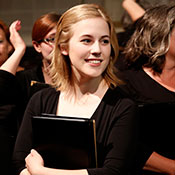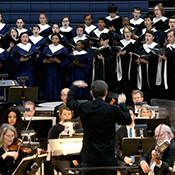
Milwaukee Symphony Chorus Returns to Ravinia for Mahler 8 with the Chicago Symphony Orchestra
DAVID LEWELLEN
PUBLISHED
Tagged Under: Chorus, Partners
Following last weekend’s concerts, the Milwaukee Symphony Orchestra has scattered for the summer. The Milwaukee Symphony Chorus, however, is still hard at work.
The chorus will perform at the Ravinia Festival on July 26 with the Chicago Symphony Orchestra and Chorus in Mahler’s epic Eighth Symphony. Some long-ago showman nicknamed it the “Symphony of a Thousand,” and though most performances are closer to 350 musicians onstage, presenting the piece is a feat of logistics and budget for any organization.
In Ravinia’s case, this is the third time this century that the festival has performed the work, each time with the MSO Chorus as a participant, and “it’s a wonderful rapport,” said Welz Kauffman, the president and CEO of the festival. He arrived in 2001, but “that relationship began long before I was here.”
The relationship has been enhanced since Cheryl Frazes Hill, longtime assistant director of the Chicago Symphony Chorus, was named director of the MSO Chorus in 2017. She has prepared the work several times in Chicago, and is currently assisting the CSO’s 120 choristers while also preparing 80 singers from Milwaukee.
Mahler wrote the symphony for two full-sized choruses, but preparing it is not as simple as assigning Chicago to be the first chorus and Milwaukee to be the second – in fact, Frazes Hill says that would be a terrible idea, because the symphony integrates the two choruses so thoroughly: “The whole idea of the piece is a conversation.” But, she says, “We’re bringing 80 singers, so 40 in each chorus, so 10 on a part. And if the parts are divided, we’re down to five on a part. It’s a challenge for any chorus. You have to be very solid and confident in what you’re doing.”
The piece presents problems of pitch and rhythm, as well as being sung in two languages: Latin in part I, German in part II. “Even finding your entrance pitch can really test the quality of the chorus,” Frazes Hill said. In rehearsal, “we’ll do it once speaking it, concentrating on the language and the rhythm. Then we’ll do the pitches, without words. It’s a multi-layered process.”
“I hadn’t heard of it before, and then I listened to it, and I was like, oh my, what have I gotten myself into?” said Mariah Taylor, who is finishing her first season in the MSO Chorus. “It’s the busiest score I’ve ever seen. It’s not the kind of piece you can sight-read.” But time and rehearsal have brought confidence, and she said, “I like being part of groups that are founded on excellence. And at the same time, it’s fun.”
For singers like Bruce Soto, in his 38th season, and Chris Krueger, in her 43rd, this is far from the first rodeo. “A lot of it came back to me,” Soto said, “but it’s a hard one to learn. It’s not an easy piece by any means. When we get together with Chicago in two weeks, then we’ll start hearing the whole thing with the full choral sound.” Krueger, who can’t remember how many Mahler 8s she’s done, said, “Part of it is like riding a bike. But every performance is a new experience.” Performing at Ravinia, she said, “is a wonderful setting, and very fulfilling. As long as we have good weather.”
The music is difficult, but “I enjoy that challenge,” said Dean Tigrani, a member of the bass section who is in his second year in the chorus. “It helps my brain to do something different from my day job” as a pathologist. “I feel privileged to be a part of it. It’s like, wow, am I really here?”
The performance is part of Ravinia’s multi-year celebration of the centennial of Leonard Bernstein’s birth, and “you can’t really do Lenny without doing Mahler,” Kauffman said. Conductor Marin Alsop, who is curating the Bernstein celebration, has conducted the Eighth “more than most people get the chance to do,” and hiring a lineup of international vocal soloists is “easier than you might think,” he said, because “so many people want to sing it” and there aren’t many opportunities.
Kauffman praised Milwaukee’s selection of Frazes Hill to lead the MSO Chorus, and he also spoke highly of Ken-David Masur, the MSO’s incoming music director. Kauffman worked with his father, the conductor Kurt Masur, and remembers a teenage Ken-David playing basketball with Wynton Marsalis. “He’s such a gifted guy and such a sweetheart.”
And when Alsop gives the downbeat on July 26, “It’s one of the most powerful pieces ever written, and it never fails,” Kauffman said. “It’s a thrilling experience.”



